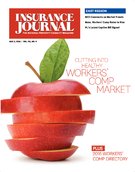The good news is that for the foreseeable future, with certain exceptions, you will not have to tell your clients their premiums are increasing 10 percent or more. Property/casualty carriers collectively, not necessarily individually, have more money than they know how to spend. Here are some facts (per A.M. Best):
- Surplus at year-end 2015 is estimated at approximately 270 percent of what it was in 1996. It has increased materially almost every year except 2008. This is in the face of more people, more cars, more property, and more plaintiff attorneys.
- Over the past 10 years, earned premiums have increased almost twice as much as claim dollars paid. The industry is making money at a faster pace than claims are being incurred.
- Claim frequency, in pure number of claim terms, has decreased materially over the past 20 years.
- Claim frequency on a net written premium (NWP) basis has decreased approximately 30 percent.
- One often overlooked fact in this day of low investment yields and excellent combined ratios (98 percent reported and only 94 percent on a normalized basis), is net investment income is estimated to be 518 percent greater than net underwriting income.
Carriers are making a lot of money. Collectively, they have no need to increase rates. These results strongly suggest a long, soft market. Moreover, implementation of technology specific to reducing claims, not predictive modeling, will continue to decrease losses further. The more losses decrease, the more surplus will increase. The more surplus increases, the more likely rates will remain soft. Keep in mind, the P/C market cycle changes on decreases in surplus, not profitability.
What might cause surplus to decrease? The obvious factors. Examples include:
- A financial crash. If this happens, agents and companies will likely have more to worry about than rates increasing.
- A series of large, insured weather catastrophes.
- Insurers being faced with large cyber liability claims they did not mean to insure or something similar related to new technology. This would be akin to the asbestos claims decades ago that are still affecting some carriers today.
One or more of these events is likely, but the event is not predictable. If it occurs, we will likely have other issues to deal with, too, so these will not be standalone factors.
These facts mean rates will likely be flat to negative for almost all lines in most geographic locations for the foreseeable future. Some property rates will continue to increase for now, but even within property, new technology already exists that will likely improve results so significantly over time that carriers will eventually even make money in these lines, too. Some carriers already recognize the advantage of this technology and are providing credits. And credits mean decreased prices.
If carriers ever truly awaken to the opportunity afforded by high premiums to give credits for homeowners installing better roofs to resist hail, profits will improve even more. Installing new roofs and technology takes time, but if casualty is already soft and property will become more soft as the technology is installed, the soft market will likely be elongated. This means companies will have to merge, acquire, or invest in agents that generate new sales.
What to Do?
For agents to thrive in the absence of rate increases and likely rate decreases, they must:
- Sell, sell, sell new accounts. Agencies must achieve a net increase in accounts annually. To make contingencies, afford expense increases, and survive and definitely to thrive, agencies must have a sales culture. This means stop paying producers that sit around waiting for the phone to ring. CSRs can do that job just as effectively and for less money. Use the difference to invest in sales or marketing, because new sales will be more important than any time in the lifetime of most agencies.
- Ditch some carriers. Some carriers do not have the financial strength to cut rates enough for agents to sell their products and for the carrier to still make money. Agents need to ditch these carriers.
- Manage agencies more effectively. Better management is essential because agencies will have to become more efficient. More efficiency will be required because expenses will continue to increase while rates remain flat to down.
This is all good news for the agencies that have a sales culture and are run efficiently. Looking back, these agencies likely will realize this is the best combination for them to succeed. So much of the competition will not wake up in time to proactively address this paradigm change, which means agencies with strong sales cultures will be able to write more business than ever. The same agents that keep waiting for a hard market will fail to keep their clients adequately apprised of rate decreases. This will make them vulnerable. The most effective agents are telling their clients what to expect relative to rates, thereby managing client expectations and fencing off competition simultaneously.
Alternately, companies may squander their surplus on wasteful mergers and acquisitions. Or surplus may plateau and begin decreasing as profits decrease, but that is five to 10 years down the road. If that happens, the best agents coming out of what will be an historic soft market will be perfectly positioned to take advantage of the hard market or continue riding the wave of an even longer soft market.
Topics Carriers Agencies Excess Surplus Tech Property Market
Was this article valuable?
Here are more articles you may enjoy.



 Cuts to Funding Mean Risks Will Pivot in Human Services Market
Cuts to Funding Mean Risks Will Pivot in Human Services Market  State Farm Inked $1.5B Underwriting Profit for 2025 but HO Loss Persists
State Farm Inked $1.5B Underwriting Profit for 2025 but HO Loss Persists  Hackers Used AI to Breach 600 Firewalls in Weeks, Amazon Says
Hackers Used AI to Breach 600 Firewalls in Weeks, Amazon Says  Commercial P/C Market Softest Since 2017, Says CIAB
Commercial P/C Market Softest Since 2017, Says CIAB 



